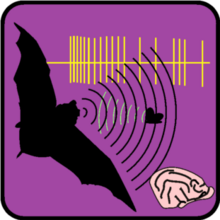Neuroethology

Neuroethology is the study of animal behavior and its control by the nervous system.[1][2][3] Neuroethology explores how the brain links stimuli (e.g. sights, sounds, or smells) to behavior. For example, many bats and Odontoceti have a special ability called echolocation. They use echolocation to find prey and to navigate. Researchers study their auditory system to show how sounds can be changed into a neural representation of sound.[4] Neuroethologists are scientists who study neuroethology. They try to discover how the nervous system works. They often use animals with special behaviors in their research.
The word neuroethology combines ideas from two fields: neurobiology (the study of the nervous system) and ethology (the study of behavior in nature). Neuroethology focusses on natural behavior. Natural behaviors of animals were created by natural selection (e.g., finding mates, moving, avoiding enemies). Neuroethology avoids artificial behaviors like those in lab experiments.
Notes[change | change source]
- ↑ Hoyle, G. (1984) The scope of Neuroethology. The Behavioral and Brain Sciences. 7:367-412.
- ↑ Ewert, P. (1980) Neuroethology. Springer-Verlag. New York.
- ↑ Camhi, J. (1984) Neuroethology. Sinauer. Sunderland Mass.
- ↑ Suga, N. (1989). For example, louder sounds might cause more neurons to respond. "Principles of auditory information-processing derived from neuroethology." J Exp Biol 146: 277-86.
